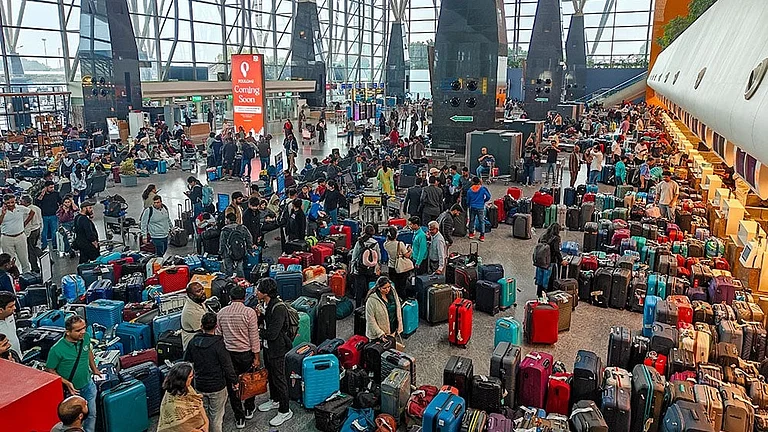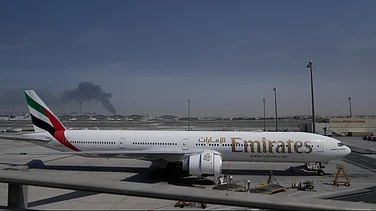The Chinese government in Beijing lashed out at the United States on Monday after US President Joe Biden said that the US would defend Taiwan militarily if Beijing would invade Taiwan.
Chinese Foreign Ministry spokesman Wang Wenbin "deplored" and "rejected" Biden's remarks, saying "Taiwan is an inalienable part of the Chinese territory and the Taiwan question is purely China’s internal affair, which brooks no foreign interference."
The unification of Chinese mainland with Taiwan, which Beijing considers a breakaway province, is a stated goal of the Communist Party of China, and party leader Xi Jinping has not ruled out the use of force — an invasion — to fulfil it.
Beijing on Monday ruled out any compromise, saying, "On issues bearing on China’s core interests including its sovereignty and territorial integrity there is no room for compromise or concession."
Here we explain the China-Taiwan conflict, Taiwan's relationship with the US, and what Biden's comment mean, and whether it means the US is changing its longstanding policy, or whether he has been quoted out of context.
The China-Taiwan status explained
The Taiwan considers itself a sovereign country, officially named the Republic of China.
The Communist Party in Beijing considers Taiwan a breakaway province and considers its Beijing-run Chinese mainland — plus breakaway Taiwan province — as the real China, officially named the People's Republic of China.
Most countries adhere to the One China Policy and identify the Beijing's idea of China as official. However, they also maintain an unofficial relationship with Taiwan, but don't identify it as an independent country. This is primarily because of Chinese economic and military strength, which means that no country wants to annoy it by going against it.
The conflict between the Beijing and Taiwan is rooted in the first half of the 20th century.
The roots of Taiwan dispute
The two Chinas — one governed from Beijing and another in the form of Taiwan — are rooted in the Chinese Civil War (1945-49) between the Chinese Communist Party (CCP) and the Nationalist Party (KMT).
In 1949, the CCP emerged victorious and took control of the Chinese mainland at Beijing and announced the formation of People's Republic of China (PRC). The defeated KMT fled to the island of Taiwan and established the Republic of China (ROC) there. The unification with Taiwan remains CCP's objective.
The KMT, which succeeded the fall of monarchy in China in 1911, envisioned China as a constitutional republic following Western models of government, explains an article of the Center for Strategic and International Studies (CSIS). It adds that the CCP, formed in 1921, sought a Chinese-styled Communist revolution and a future socialist China upholding the principals of Marxism-Leninism — and eventually Maoism.
The CSIS article notes, "On October 1, 1949, Mao Zedong, the chairman of the CCP, announced the establishment of the PRC in Beijing while Chiang Kai-Shek, generalissimo of the KMT, withdrew to Taiwan, bringing 2 million KMT troops and supporters with him. His army proclaimed Taipei the temporary capital of the Republic of China."
The US 'strategic ambiguity' policy
The United States recognised Taiwan's ROC as China until 1979, when Washington DC established diplomatic relations with Beijing and recognised PRC as the real China under the One China policy. However, the US continued economic and military relations with Taiwan and has over the years armed the country.
The US has since then followed the "strategic ambiguity" policy where it has assured Taiwan of help in case of Chinese attack but has been deliberately vague about the nature of that help. This is established under the Taiwan Relations Act, 1979.
The Economist explains, "This did not commit America explicitly to come to Taiwan’s defence. But it did promise to provide Taiwan with 'arms of a defensive character' and to 'consider any effort to determine the future of Taiwan by other than peaceful means a threat to the peace and security of the Western Pacific Area and of grave concern to the United States'.
The supporters of this policy say it has provided enough reassurance that the United States would not let an invasion go unimpeded to deter China, but not so much as to embolden those in Taiwan who favour a formal declaration of independence which might result in an armed conflict and rope in the United States in some way, as per The Economist.
However, Biden's comment on Monday, and earlier similar comments as well, appear to suggest that US policy is changing towards overt support of Taiwan in case Beijing invades.
Is US really changing its policy?
The following exchange between a reporter and Biden led to these conversations on Taiwan.
Reporter: "You didn't want to get involved in the Ukraine conflict militarily for obvious reasons. Are you willing to get involved militarily to defend Taiwan if it comes to that?"
Biden: "Yes. That's the commitment we made."
Despite this, the Biden administration maintains the policy has not changed.
This was the third time that Biden has said something like this on Taiwan. The first comment was in October 2021 and the second was in August 2021, when Vox notes, Biden had compared the US approach to Taiwan with the US pledge to defend NATO countries, even as an official later walked back those remarks.
It has also been reported that while Biden said "yes" when asked about military support, he might not have meant a NATO-like committment.
The PTI reported that Biden had actually taken a nuanced view during his engagement with reporters and the "yes" was a singular moment.
The PTI reported, citing a video of Biden's press conference, that Biden was talking of Washington’s policy on Taiwan after the Russian invasion of Ukraine where America was not militarily involved.
It quoted Biden as saying, “If there is no rapprochement between Ukraine and Russia and sanctions are not sustained in many ways, then what signal does it send to China about attempting to take Taiwan by force. They [the Chinese] are already flirting with danger by flying so close and all the manoeuvres they are undertaking."
Biden was referring to Beijing's incursions into Taiwan's air defence zone.
He continued, “The US made the commitment. We support the One China Policy that does not mean China has the jurisdiction to use force to take over Taiwan. We stand firmly with Japan and other nations to not let that happen. I expect it will not happen, it will not be attempted.
"My expectation is a lot of it depends on how strongly the world makes it clear that this kind of action is going to result in long-term disapprobation by the rest of the community."
When asked if the US is willing to get involved militarily to defend Taiwan, Biden did say “yes”.
He continued, as per PTI, "That is the commitment we made. Here is the situation: we agree with the One China Policy. We signed on to it and all the attendant agreements made from there.
"But the idea that it can be taken by force is just not appropriate, it will dislocate the entire region and be another action similar to what happened in Ukraine. So, it is a burden that is even stronger."






















